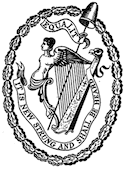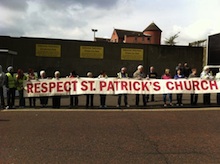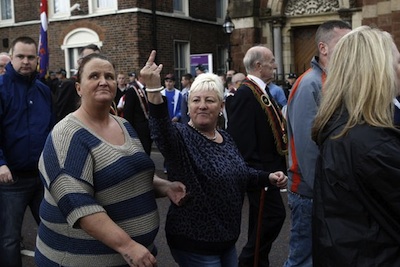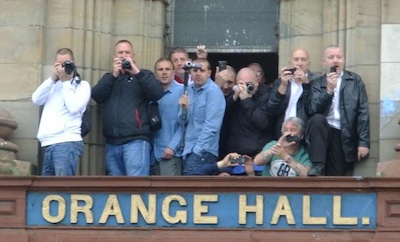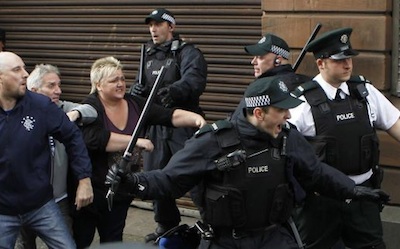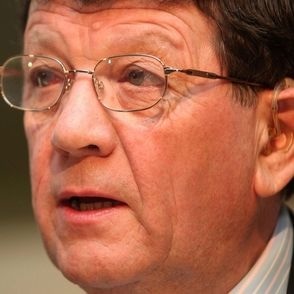After The Penis YouTube Link
Theresa Villiers
A genealogical survey of the peerage of Britain as well as the royal families of Europe
Theresa Anne Villiers was born on 5 March 1968. She is the daughter of George Edward Villiers and Anne Virginia Threlfall.2 She married Sean Wilken on 19 June 1999.She held the office of Member of the European Parliament for Greater London.1 From 19 June 1999, her married name became Wilken. She lived in 2003 at 32 Abdale Road, London, England.
Anne Virginia Threlfall is the daughter of Cuthbert Raymond Forster Threlfall. She married George Edward Villiers, son of Algernon Edward Villiers and Annie Augusta Merewether Massy, on 25 August 1962.
From 25 August 1962, her married name became Villiers.
Children of Anne Virginia Threlfall and George Edward Villiers
Edward Richard Villiers+2 b. 6 Jul 1963
Henry Raymond Villiers2 b. 1 Nov 1965
Theresa Anne Villiers2 b. 5 Mar 1968
George Edward Villiers 25 August 1931
George Edward Villiers was born on 25 August 1931. He is the son of Algernon Edward Villiers and Annie Augusta Merewether Massy.2 He married Anne Virginia Threlfall, daughter of Cuthbert Raymond Forster Threlfall, on 25 August 1962.
Theresa Anne Villiers (born 5 March 1968) is a British Conservative Party politician. She is the Member of Parliament (MP) for Chipping Barnet and the Secretary of State for Northern Ireland.She was appointed as a Privy Counsellor on 9 June 2010.
Villiers was born in London in 1968, the daughter of George Edward Villiers and Anne Virginia (née Threlfall). On her father's side she is a descendant of the Honourable Edward Ernest Villiers (1806–1843), brother of George Villiers, 4th Earl of Clarendon,Thomas Hyde Villiers, Charles Pelham Villiers and Henry Villiers.[4] She is also a distant relative of the actor James Villiers.
Growing up in North London, she was educated at the independent Francis Holland School. Villiers gained a Bachelor of Laws (LLB) degree with first class honours in 1990 from the University of Bristol, and went on to obtain a Bachelor of Civil Law (BCL) from Jesus College, Oxford, in 1991. After graduating she worked as a barrister and as a lecturer at King's College London (1994–99).
[edit]Member of the European Parliament
She was elected Member of the European Parliament (MEP) for the London constituency in 1999, and was re-elected in 2004. She stood down after the 2005 general election when she was elected as the Member of Parliament for Chipping Barnet.[5]
As an MEP, her main interests were finance and financial services, the preservation of London's green belt, Cyprus, animal welfare and campaigning against the Euro and the European Constitution. She served as Deputy Leader of the Conservatives in the European Parliament between 2001 and 2002. She also served as a member of the governing board of the Conservative Party during this period.
“ Now is a crucial time for the talks and it is important that everyone who is a friend of Cyprus makes their support clear in the push for a just, lasting and balanced settlement in Cyprus which will see the whole island united again with a single sovereignty, a single international personality and a single citizenship. ”
—Theresa Villiers at Conservative Party Conference on Cyprus.
[edit]Member of Parliament
In 2003, following Sir Sydney Chapman's announcement that he would retire at the following election, Villiers was selected as the Conservative parliamentary candidate for Chipping Barnet. Although Chapman's majority at the 2001 general election was only 2,701 Chipping Barnet was considered a "safe" Conservative seat, and in the 2005 general election she held the seat with an increased majority of 5,960. She resigned her seat as an MEP, which under the list system was filled by the next candidate on the Conservatives' London regional list, Syed Kamall. She lives in the constituency, in Arkley.
[edit]Shadow Cabinet
In December 2005, following the election of David Cameron as Conservative leader, Villiers was promoted to the Shadow Cabinet after just seven months in Parliament, as Shadow Chief Secretary to the Treasury. In July 2007, Cameron promoted her to Shadow Secretary of State for Transport.[citation needed]
[edit]MPs' Expenses: Second London home
The Daily Telegraph reported on 11 May 2009 that Theresa Villiers bought a £345,000 property in Kennington. In 2007-08 she claimed a total of £18,181 in parliamentary allowances for this second London home.
She also has a house in Arkley in her north London constituency of Chipping Barnet. The house, a semi-detached property that she bought for £296,500 in May 2004, is an 8 minute drive away from High Barnet tube station, from which commuters can reach Westminster in about 45 minutes.[6]
[edit]Political positions
Villiers supported the temporary suspension of Ken Livingstone by the Adjudication Panel for England, who examined the case after a complaint from the Board of Deputies of British Jews to the Standards Board for England.
Since late September 2008, Villiers has dedicated a considerable proportion of her public announcements to aviation policy, specifically the expansion of airports in the South East of England. There has been considerable debate within Conservative Party grassroots membership about her policies. Many commentators have defended her policies as environmentalist and politically expedient (given the high number of marginal constituencies around London Heathrow Airport), while others have criticised her for putting businesses and even family holidays at risk by undermining Heathrow as a major international hub airport and intentionally supporting higher costs for flights. Criticism of Villiers's aviation policy was heightened when she spoke out against the Mayor of London's proposals for a new London airport based in the Thames Estuary, and alternative expansions at Gatwick and Stansted airports, favouring a high speed rail link from London to Leeds as an alternative policy.
"The European Union has been one of the greatest offenders in excluding developing countries from participating in European markets. There is simply no way that impoverished African farmers can compete with the subsidies given to farmers under the Common Agricultural Policy"
"The (European) Constitution is designed to create a country called Europe and give ever more power to Brussels at the expense of nationally elected governments. I think that's bad for democracy, bad for Britain and bad for Europe"
Voting Record — Theresa Villiers MP, Chipping Barnet (11500)
Note: our records only go back to 1997 for the Commons and 2001 for the Lords (more details).
From To Party Rebellions (explain...) Attendance (explain...) Teller
6 May 2010 still in office Con 3 votes out of 498, 0.6% 498 votes out of 599, 83.1% 0 times
5 May 2005 12 Apr 2010 Con 23 votes out of 881, 2.6% 881 votes out of 1288, 68.4% 0 times
External Links
See Theresa Villiers's Parliamentary speeches at: TheyWorkForYou.com
Contact your MP for free at: WriteToThem.com
Form a long term relationship with your MP: HearFromYourMP.com
New! Local party donations declared to the Electoral Commission:
Interesting Votes
Votes in parliament for which this MP's vote differed from the majority vote of their party (Rebel), or in which this MP was a teller (Teller), or both (Rebel Teller).
See also all votes... attended | possible
House Date Subject Theresa Villiers Con Vote Rôle
Commons 11 Jul 2012 United Kingdom Borders — Sittings of the House (Thursdays) (9.30 am to 5.00 pm) Majority no Rebel
Commons 11 Jul 2012 United Kingdom Borders — Sittings of the House (Tuesdays) (11.30 am to 7.00 pm) Majority no Rebel
Commons 9 Sep 2011 Prayers — Clause 1 — Duties of the Secretary of State Majority aye Rebel
11 May 2010 Stopped being Shadow Secretary of State for Transport, Transport
House Date Subject Theresa Villiers Con Vote Rôle
Commons 29 Oct 2008 Opposition Day — [11th Allotted Day — Second Part] — Canterbury City Council Bill (By Order) minority aye Rebel
Commons 22 Oct 2008 Human Fertilisation and Embryology Bill Third Reading Majority no Rebel
Commons 22 Oct 2008 Deferred Divisions — Clause 68 — Commencement Majority aye Rebel
Commons 22 Oct 2008 Deferred Divisions — Clause 4 — Prohibitions in connection with genetic material not of human origin Majority aye Rebel
Commons 22 Oct 2008 Deferred Divisions — Human Fertilisation and Embryology Bill [Lords] Majority aye Rebel
Commons 22 Oct 2008 Deferred Divisions — Human Fertilisation and Embryology Bill [Lords] Majority aye Rebel
Commons 20 May 2008 Human Fertilisation and Embryology Bill — Change abortion limit from 24 weeks to 22 weeks — rejected Majority aye Rebel
Commons 20 May 2008 Human Fertilisation and Embryology Bill — Prospects for life of handicapped child must be given before abortion — rejected Majority aye Rebel
Commons 20 May 2008 Human Fertilisation and Embryology Bill — Change abortion limit from 24 weeks to 20 weeks — rejected Majority aye Rebel
Commons 19 May 2008 Human Fertilisation and Embryology Bill — Sibling compatibility only regenerative tissue — rejected Majority aye Rebel
Commons 19 May 2008 Human Fertilisation and Embryology Bill — Testing for sibling tissue compatibility Majority aye Rebel
Commons 19 May 2008 Human Fertilisation and Embryology Bill — Testing for gender-related illness Majority aye Rebel
Commons 19 May 2008 Human Fertilisation and Embryology Bill — Animal DNA may be inserted into an embryo Majority aye Rebel
Commons 19 May 2008 Human Fertilisation and Embryology Bill — Cannot use gametes or pronuclei — rejected Majority aye Rebel
Commons 19 May 2008 Human Fertilisation and Embryology Bill — Human-animal hybrid licenses Majority aye Rebel
Commons 12 May 2008 Human Fertilisation and Embryology Bill — Second Reading Majority no Rebel
6 Jul 2007 Stopped being Shadow Chief Secretary To the Treasury, Treasury
6 Jul 2007 Became Shadow Secretary of State for Transport, Transport
Commons 19 Mar 2007 Equality Act (Sexual Orientation) Regulations Majority no Rebel
Commons 7 Mar 2007 House of Lords Reform — Composition Option 6 (80 per Cent. Elected) Majority no Rebel
Commons 7 Mar 2007 House of Lords Reform — Composition Option 5 (60 per Cent. Elected) — rejected minority no Rebel
Commons 7 Mar 2007 House of Lords Reform — Composition Option 4 (50 per Cent. Elected) — rejected minority no Rebel
Commons 14 Mar 2006 Animal Welfare Bill — New Clause "8" — Docking of dogs' tails — Working dogs minority no Rebel
18 Jan 2006 Stopped being a member of the Environmental Audit Committee
16 Dec 2005 Became Shadow Chief Secretary To the Treasury, Treasury
14 Jul 2005 Became a member of the Environmental Audit Committee
Commons 13 Jul 2005 Committees — Administration Committee — Pay for Chairmen of Select Committees minority aye Rebel
Commons 13 Jul 2005 Committees — Administration Committee — Pay for Chairmen of Standing Committees minority aye Rebel
Policy Comparisons
This chart shows the percentage agreement between this MP and each of the policies in the database, according to their voting record.
Agreement Policy
10% Abortion, Embryology and Euthanasia- Against
99% Business and community control of schools: For
100% Cap or Reduce Civil Service Pay and Conditions
100% Civil aviation pollution - For limiting
81% Control Orders
50% Crossrail - In favour
100% Deployment of UK armed forces in Afghanistan
100% Equal Number of Electors Per Constituency
28% European Union - For
64% Fully Elected House of Lords
100% Gambling - Against permissiveness
100% Hold a UK referendum on Lisbon EU Treaty
71% Homosexuality - Equal rights
0% Identity cards - For introduction
100% Increase VAT
100% Iraq Investigation - Necessary
1% Ministers Can Intervene in Coroners' Inquests
69% No detention without charge or trial
0% No Polls Clash With MP Election System Referendum
50% Nuclear power - For
30% Parliamentary scrutiny - Reduce
0% Post office - in favour of Government policy
100% Post office closures - against
100% Privatise Royal Mail
75% Promote Occupational Pensions
0% Proportional Representation Voting System - For
100% Referendum on Alternative Vote for MP Elections
50% Remove Hereditary Peers from the House of Lords
42% Right to strike
96% Schools - Greater Autonomy
21% Smoking ban - In favour
82% Stop climate change
0% Termination of pregnancy - against
31% Terrorism laws - For
100% The UK should not ratify the Lisbon Treaty
50% Transparency of Parliament
100% Trident replacement - In favour
100% Tuition fees - Set Upper Limit at £9,000 per Year
100% University Tuition Fees - For
0% Voting age - Reduce to 16
100% War - Parliamentary authority not necessary
View slideshow
|
Photographed by Watkins, c. 1864. Clarendon served as Lord Lieutenant of Ireland (1847–52) and made efforts to ease disorder and distress during the f [...]
|
This rather gritty photograph gives us a good idea of what a typical labourer would have looked like during the Famine period. Such portrait photograp [...]
|
Trevelyan was Assistant Secretary at the Treasury during the Famine. Trevelyan has been associated with the inadequate relief policies of the Whig gov [...]
|
|
A Liberal, Wood served as Chancellor of the Exchequer in Lord John Russell's government (1846-1852). He was responsible for keeping relief to a minimu [...]
|
Russell was the Whig Prime Minister during the Famine (1846-52). In August 1847 Lord Clarendon wrote rather coldly to Lord John Russell: "We shall be [...]
|
'Servants of the Lord, Rendering an Account of thier Stewardship during the Famine of 1847.' This view of the Famine contrasts sharply with that of Pu [...]
|
|
Reception in St Patrick's Hall, Dublin Castle on the occasion of Queen Victoria's visit to Ireland in August, 1849.
|
Engraved from a portrait by George Richmond. Monteagle was Chancellor of the Exchequer from 1835 to 1839, and Comptroller General from 1839 to 1865. H [...]
|
Engraved from a portrait by George Richmond. Clarendon served as Lord Lieutenant of Ireland (1847–52) and made efforts to ease disorder and distress d [...]
|
|
Engraved by William Ward after a portrait by John Ward. Sir Robert Peel, Conservative Prime Minister in 1845-6. His secret purchase of Indian corn hel [...]
|
On 17 January 1846 O’Connell raised the matter of famine in the House of Commons: I have shown you our distress. I have shown you that there are no a [...]
|
1848 witnessed revolution all over Europe. In Ireland, William Smith O'Brien called for the establishment of a National Guard, and an armed rising wa [...]
|
|
A Liberal, Wood served as Chancellor of the Exchequer in Lord John Russell's government (1846-1852). He was responsible for keeping relief to a minimu [...]
|
The son of Quaker William Tuke (1732-1822), English tea and coffee merchant and philanthropist. James entered the family business and helped in the ma [...]
|
Palmerston was the eldest child in a family of two boys and three girls born to Henry Temple and Mary Mee. As well as their large Hampshire property, [...]
|
|
Mount Stewart was the home of Charles William Vane (1778-1854), 3rd Marquess of Londonderry during the famine. Lord Londonderry, one of the ten riches [...]
|
Powerscourt at Enniskerry in Wicklow was was built for Richard Wingfield, a descendant of Sir Richard Wingfield, and a member of the Protestant Ascend [...]
|
British Prime Minister: 6 February 1855-19 February 1858; 12 June 1859-18 October 1865. He was the eldest child in a family of two boys and three girl [...]
|
|
In 1847, Major Denis Mahon paid £4,000 for the emigration of one thousand tenants to Canada. Nearly a quarter of the emigrants died enroute, many of t [...]
|
A few emigrant ships sailed directly from Ireland, as is illustrated here. However, the majority of emigrants had to first cross to Liverpool.
|
The emigrant ship Peru leaving Cork for Melbourne, Australia ca. 1847.
|
|
The South Street quay in New York was the main point of entry for Irish immigrants in the 1840s.
|
Quebec was the main port of entry for Irish famine immigrants in 1847.
|
|
|
Many emigrant ships took up to three months to cross the Atlantic. The crowded ship's hold was a breeding ground for diseases like dysentery and typhu [...]
|
|
ERIN-In forty years I have lost, through the operation of no natural law, more than Three Millions of my Sons and Daughters, and they, the Young and t [...]
|
|
'Scalp of Brian Connor, near Kilrush Union House'. December, 1849.
|
A cartoon showing Robert Peel struggling with the problems posed by potatoes and corn, and he is surrounded on all sides by political opponents.
|
Government sale of Indian corn at Cork, April 1846.
|
|
This photograph shows British Army officers as they would have looked during the famine.
|
In a scene not very different from one of the famine period: men break stones and women carry stones on relief works at An Cheathrú Rua (Carraroe), Co [...]
|
More than half a century after the famine, the houses of the poor had changed little. The cottage show here has earthen floors and little furniture. T [...]
|
|
Three bare-foot children photographed in their cottage on Gorumna Island, Co. Galway. The ragged children lean against a straw bed which rests on an e [...]
|
The bottom of the page reads: ‘What did they do to your mother in the poorhouse, Eliza?’ ‘They trampled on her and killed her, Sir.’
|
During the Famine, isolated towns such as Schull were usually the last to receive much needed relief. By 1849, the population of Schull parish had dro [...]
|
|
Dr. Robert Traill was Rector of Schull, at the time of the famine. The town suffered exceptionally high casualties from famine and disease. By 1849, t [...]
|
Sir Charles Trevelyan, Assistant Secretary at the Tresury. He was in charge of all famine relief in Ireland. Trevelyan has been associated with the in [...]
|
Sir Charles Wood, Chancellor of the Exchequer in Russell's government and responsible for keeping relief to a minimum.
|
|
In August 1847 Lord Clarendon wrote coldly to Lord John Russell: "We shall be equally blamed for keeping them[the Irish] alive or letting them die and [...]
|
Sir Robert Peel, Conservative Prime Minister in 1845-6. His secret purchase of Indian corn helped prevent widespread famine in the first year of the p [...]
|
'Ballinaboy School [Co. Galway], near the monastery, 10th August, 1850', established by the Rev. Dallas.
|
|
|
|
|
|
|
In this heart rending scene, an infant seems to be dying in the arms of its helpless mother.
|
Potatoes often appeared to be perfectly sound when lifted from the ground but were later found to have rotted in store, with disastrous consequences t [...]
|
|
|
|
|
|
The correspondent for the Illustrated London News describes the scene in the winter of 1849: 'Another Sketch follows (of Miss Kennedy), which shows th [...]
|
Recipes for numerous varieties of soup appeared frequently in the national newspapers, all claiming to be nutritious and generally aiming at the produ [...]
|
|
|
One of Achill's most famous landmarks is that of the Achill Mission or 'the Colony' at Dugort. In 1831 the Protestant Reverend Edward Nangle founded a [...]
|
By a Joint Resolution of Congress 3 March 1847, the 36 gun frigate Macedonian and the sloop‑of‑war Jamestown, were placed in civilian hand [...]
|
Contemporary Lithograph of Charles Trevelyan.
|
|
Village of Keel, Achill Island, Co. Mayo.
|
A contemporary lithograph; 'The Protestant missionary settlement at Isle of Achill'
|
Quakers in England and Ireland responded quickly and generously to the need for direct food relief. The Quaker ironmasters Abraham and Albert Darby of [...]
|
|
A chromolithograph showing Erin wrestling with the spectre of famine while the Chief Secretary of Ireland, Arthur Balfour plays golf. Attributed to th [...]
|
This chromolithograph depicts a wealthy landlord with his female companion seated on a chaise-longue. The table nearby is laden with food and drink. T [...]
|





























































